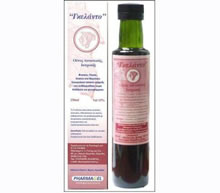
Λεξικό .. Allergy and risk of cancer,
First National Health and Nutrition Examination Survey (NHANESI), conducted in 1971-1975, included a cohort of 6913 adults for whom history of smoking, allergies, and other factors was obtained. Demonstrated that the history of allergy does not protect against subsequent cancer, and may be a risk factor. The possibility is raised that a history of hives may be a particular risk factor for lymphatic-hematopoietic malignancies [1].
There is a long-standing interest in finding whether allergic disorders cause or prevent cancer. Vojtechova P and, Martin RM.[2] meta-analyzed associations of allergies with prostate, breast, and colorectal cancers. We searched MEDLINE, EMBASE, and Web of Science between 1966 and 2008 and eligible reference lists. A total of 16 observational studies were included. Meta-analyses revealed no evidence that asthma, hay fever, or 'any allergy' are associated with cancers of the breast (relative risk, RR = 0.93, 95% CI: 0.73-1.19 for asthma; 1.04, 0.94-1.16 for hay fever; 1.01, 0.94-1.08 for any allergy); prostate (RR = 0.93, 95% CI: 0.76-1.15 for asthma; 0.96, 0.87-1.05 for hay fever; 1.01, 0.87-1.17 for any allergy); or colorectum (RR = 0.95, 95% CI: 0.77-1.16 for asthma; 0.95, 0.86-1.05 for hay fever; 0.94, 0.85-1.04 for any allergy). There was a positive association of atopy (assessed by allergen-specific IgE or skin prick testing) with prostate cancer (RR = 1.43, 95% CI: 1.08-1.91), but not breast (1.18, 0.90-1.55) or colorectal (1.32, 0.69-2.53) cancers. There is little epidemiological support for the immune surveillance theory or antigenic stimulation theory in breast or colorectal carcinogenesis. The findings for prostate cancer warrant further investigation [2].
In an electronic literature search of the MEDLINE, ISI Web of Science, and EMBASE databases from 1979 through February 2007, Linos E, et al (2007) identified case-control and cohort studies quantifying associations between a history of asthma, eczema, or hay fever or allergy and a medically confirmed diagnosis of glioma or meningioma. They performed meta-analysis by pooling studies according to the inverse of their variances. They evaluated publication bias using funnel plot and sensitivity analyses. A total of eight observational studies were included, with a total of 3450 patients diagnosed with glioma and 1070 patients with meningioma. A history of atopic disease was inversely related to risk of gliom[3].
References
1. McWhorter WP.: Allergy and Risk of Cancer A prospective study using NHANESI followup data. Cancer 62:451-455, 1988.
2. Vojtechova P, Martin RM. The association of atopic diseases with breast, prostate, and colorectal cancers: a meta-analysis. Cancer Causes Control. 2009 Apr 2.
3. Linos E, Raine T, Alonso A, Michaud D. Atopy and risk of brain tumors: a meta-analysis. J Natl Cancer Inst. 2007 Oct 17;99(20):1544-50.
Γκέλης Ν.Δ. - Λεξικό Αλλεργίας - Εκδόσεις ΒΕΛΛΕΡOΦΟΝΤΗΣ - Κόρινθος 2013
Gelis Ν.D. - Dictionary of Allergies - VELLEROFONTIS Publications - Corinth 2013




